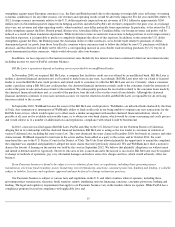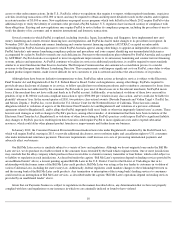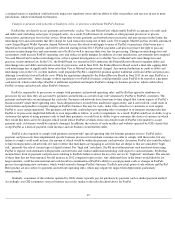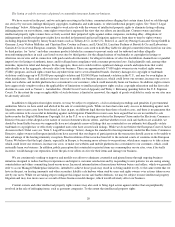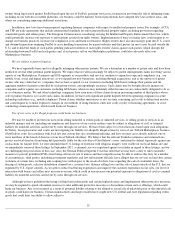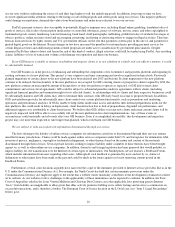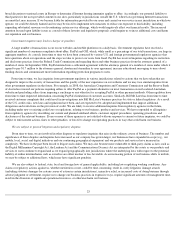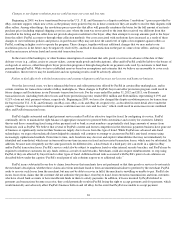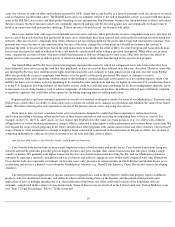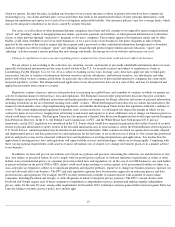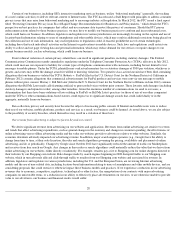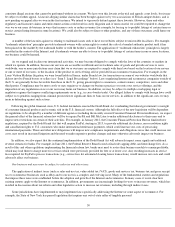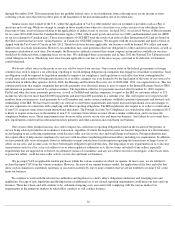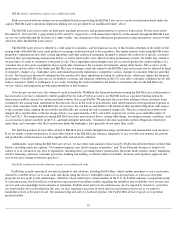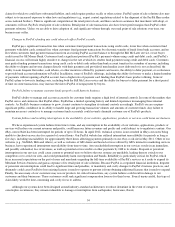eBay 2012 Annual Report Download - page 26
Download and view the complete annual report
Please find page 26 of the 2012 eBay annual report below. You can navigate through the pages in the report by either clicking on the pages listed below, or by using the keyword search tool below to find specific information within the annual report.
Changes to our dispute resolution process could increase our costs and loss rate.
Beginning in 2009, we have transitioned buyers in the U.S., U.K. and Germany to a dispute resolution (“resolutions”) process provided by
eBay customer support, which now serves as the primary entry point for buyers in these countries if they are unable to resolve their disputes with
eBay sellers. Among other things, the resolutions process provides that eBay will generally reimburse the buyer for the full amount of an item's
purchase price (including original shipping costs) in cases where the item was not received or the item they received was different from that
described in the listing and the seller does not provide adequate resolution to the buyer. eBay then attempts to recoup amounts paid to the buyer
from the seller's PayPal accounts or through other collection methods. Our costs associated with resolutions have increased as a result of these
changes to our resolutions policies and process, in part because eBay may not have the same level of rights of recoupment against sellers as
PayPal, resulting in higher costs to operate the program. These changes, together with any additional changes that we may make to our
resolutions process in the future, may be negatively received by, and lead to dissatisfaction on the part of, some of our sellers, and may also
result in an increase in buyer fraud and associated transaction losses.
In the event of the bankruptcy or other business interruption of a merchant that sells goods or services in advance of the date of their
delivery or use (e.g., airline, cruise or concert tickets, custom-
made goods and subscriptions), eBay and/or PayPal could be liable to the buyers of
such goods or services, either through its buyer protection program or through chargebacks on payment cards used by customers to fund their
payment through PayPal. While we have established reserves based on assumptions and estimates that we believe are reasonable to cover such
eventualities, these reserves may be insufficient and our operating results could be adversely affected.
Failure to deal effectively with bad transactions and customer disputes would increase our loss rate and harm our business.
Over the last several years, we have enhanced the buyer and seller protections offered by PayPal in certain eBay marketplaces, and in
certain countries for transactions outside of eBay marketplaces. These changes to PayPal's buyer and seller protection program could result in
future changes and fluctuations in our Payments transaction loss rate. For the years ended December 31, 2012 and 2011, our Payments
transaction losses (including both direct losses and buyer protection payouts) totaled $281 million and $246 million, representing 0.19% and
0.21% of our net total payment volume, respectively. Beginning in 2009, we have also changed the dispute resolution process for transactions
for buyers in the U.S., U.K. and Germany (on eBay.com, eBay.co.uk and eBay.de, respectively), as described in more detail above under the
caption “Changes to our dispute resolution process could increase our costs and loss rate,” which could result in an increase in our combined
eBay and PayPal transaction losses.
PayPal's highly automated and liquid payment service makes PayPal an attractive target for fraud. In configuring its service, PayPal
continually strives to maintain the right balance of appropriate measures to promote both convenience and security for customers. Identity
thieves and those committing fraud using stolen payment card or bank account numbers can potentially steal large amounts of money from
businesses such as PayPal. We believe that several of PayPal's current and former competitors in the electronic payments business have gone out
of business or significantly restricted their businesses largely due to losses from this type of fraud. While PayPal uses advanced anti-fraud
technologies, we expect that technically knowledgeable criminals will continue to attempt to circumvent PayPal's anti-fraud systems using
increasingly sophisticated methods. From time to time, such fraudsters may discover and exploit vulnerabilities that may not immediately be
identified and remediated, which may in turn result in one-time increases in fraud and associated transaction losses, which may be substantial. In
addition, because users frequently use the same passwords for different sites, a data breach of a third party site can result in a spike in eBay
and/or PayPal transaction losses. PayPal's service could also be subject to employee fraud or other internal security breaches, and PayPal may be
required to reimburse customers for any funds stolen as a result of such breaches. Merchants could also request reimbursement, or stop using
PayPal, if they are affected by buyer fraud or other types of fraud. Additional fraud risks associated with PayPal's point of sale solutions are
described below under the caption “PayPal's retail point of sale solutions expose us to additional risks.”
PayPal incurs substantial losses due to claims from buyers that merchants have not performed or that their goods or services do not match
the merchant's description, whether those claims arise from merchant fraud or from an unintentional failure to perform by the merchant. PayPal
seeks to recover such losses from the merchant, but may not be able to recover in full if the merchant is unwilling or unable to pay. PayPal also
incurs losses from claims that the customer did not authorize the purchase, from buyer fraud, from erroneous transmissions and from customers
who have closed bank accounts or have insufficient funds in them to satisfy payments. In addition, if losses incurred by PayPal related to
payment card transactions become excessive, they could potentially result in PayPal losing the right to accept payment cards for payment, which
would materially and adversely affect PayPal's business both on and off eBay. In the event that PayPal was unable to accept payment
24



